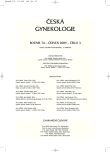-
Medical journals
- Career
IgG antibodies against laminin-1 in serum and in peritoneal fluid in patients with decreased fertility
Authors: R. Červená 1; K. Bibková 1; Z. Mičanová 1; B. Šedivá 2; Z. Ulčová-Gallová 1
Authors‘ workplace: Gynekologicko-porodnická klinika LF UK a FN Plzeň, přednosta doc. MUDr. Z. Rokyta, CSc. 1; Katedra matematiky, Fakulta aplikovaných věd, Západočeská Univerzita, Plzeň, vedoucí prof. RNDr. P. Drábek, DrSc. 2
Published in: Ceska Gynekol 2009; 74(3): 188-192
Overview
Objective:
To study of IgG antibodies against laminin-1 (IgG-a-Ln-1) in patients with decreased fertility, especially with endometriosis and with diagnosis of polycystic ovaries.Design:
Prospective study.Setting:
Special Consultation for Immunology of Reproduction and Research Laboratories for Reproductive Immunology, Department of Gynaecology and Obstetrics, Medical School of Charles University and Faculty Hospital, Pilsen.Methods:
Commercial ELISA kits for detection of IgG antibodies against laminin-1 in serum (S) and peritoneal fluid (PF) in 120 patients after diagnostic laparoscopy, and in serum in 277 patients after 2-3 in vitro fertilizations and with diagnosed endometriosis.Results:
Only 16 positive results in IgG-a-Ln-1 antibodies (more than 15 IU/ml ) were detected in sera and peritoneal fluids in the group of 120 women after laparoscopy.
We have not detected any serum IgG-a-Ln-1 positivity in the group of 277 patients after 2-3 unsuccesfull IVF and with anamnestical date about endometriosis together.Conclusion:
Increased levels of IgG-a-Ln are in particular found in endometriosis Iľ-IIľ and in diagnosis of polycystic ovaries, in female diseases also related to autoimmune process.Key words:
infertility, endometriosis, polycystic ovaries, IgG antibodies against laminin-1.
Sources
1. Burgeson, RE., Chiquet, M., Deutzmann, R., et al. A new nomenclature for the laminins. Matrix Biol, 1994, 14, p. 209-211.
2. Carey, SW., Klein, NW. Autoantibodies to lamini and other basement membrane proteins in sera from monkeys with histories of reproductive failure identified by cultures of whole rat embryos. Fertil Steril, 1989, 51, p. 711-718.
3. Colognato, H., Yourchenco, PD. Formand fiction: the laminin family of heterotrimers. Dev Dyn, 2000, 218, p. 213-234.
4. Gruberová, J., Ulčová-Gallová, Z., Bibková, K., et al. Jsou protilátky proti lamininu-1 významným markerem snížené plodnosti u žen? Čes Gynek, 2007, 72, s. 284-286.
5. Iborra, A., Palacio, JR., Ulcova-Gallova, Z., Martinez, P. Autoimmune response in women with endometriosis. Am J Reprod. Immunol, 2004, 44, p. 236-241.
6. Inagaki, J., Matsuura, E., Aoki, K. Method of assaying antilamini-1 antibody and application thereof. US Patent, 2006, 7029867.
7. Inagaki, J., Kondo, A., Lopez, LR., et al. Pregnancy loss and endometriosis: pathogenic role of anti-lamini-1 autoantibodies. Ann NY Acad Sci, 2005, 1051, p. 174-184.
8. Inagaki, J., Kondo, A., Lopez, LR. Anti-laminin-1 autoantibodies, pregnancy loss and endometriosis. Clin Dev Immunol, 2004, 11, p. 261-266.
9. Inagaki, J., Matsuura, E., Nomizu, M., et al. IgG anti-laminin-1 autoantibody and recurrent miscarriages. Am J Reprod Immunol, 2001, 45, p. 232-238.
10. Mathur, S., Garza, DE., Smith, LF. Endometrial autoantigens eliciting imunoglobulin IgG, IgA and IgM responsesin endometriosis. Fertil Steril, 1990, 54, p. 56-63.
11. Murray, P., Edgar, D. Regulation of programmed all dealth by basement membranes in embryonic development. J Cell Biol, 2000, 150, p. 1215-1221.
12. Odukoya, OA., Wheatcroft, N., Weetmann, AP., Cooke, ID. The prevalence of endometrial imunoglobulin G antibodies in patients with endometriosis. Hum Reprod, 1995, 10, p. 1214-1219.
13. Reddy, KV., Meterji, PK. Integrin cell adhesion molecules in endometrium of fertile and infertile women thronghout menstrual cycle. Indian J Exp Biol, 1999, 37, p. 323-331.
14. Sherer, Y., Tartakover-Matalon, S., Blank, M., et al. Multiple autoantibodies associated with autoimmune reproductive failure. J Assist Reprod Genet, 2003, 20, p. 53-57.
15. Shoenfeld, Y, Blank, M. Autoantibodies associated with reproductive failure. Lupus, 2004, 13, p. 643-648.
16. Szczepaňska, M., Skrzypczak, J., Kamieniczna, M. Antizona and antisperm autobodies in women with endometriosis and/or infertility. Fertil Steril, 2001, 75, p. 97-105.
17. Timpl, R., Brown, JC. Supramolecular assembly of basement membranes. Bioessays, 1996, p. 123-132.
18. Turpeenniemi-Hujamen, T., Ronnberg, L., Kauppila, A., et al. Laminin in the human embryo implantation: analogy to the invasion by malignit cells. Fertil Steril, 1992, 58, p. 105-113.
19. Ulcova-Gallova, Z., Bouse, V., Svabek, L., et al. Endometriosis in reproductive imunology. Am J Reprod. Immunol, 2002, 47, p. 269-274.
20. Ulcova-Gallova, Z., Gruberova, J., Bibkova., K, et al. Antibodies against laminin-1 and sperm, intraacrosomal proteins in semen from infertile couples. Am J Reprod Imunnol, 2008, 54, 4‑5, p. 211-216.
Labels
Paediatric gynaecology Gynaecology and obstetrics Reproduction medicine
Article was published inCzech Gynaecology

2009 Issue 3-
All articles in this issue
- Proteomics and biomarkers for detection of ovarian cancer
- Paraneoplastic syndromes in oncogynecology
- New diagnostic approach to different hydatidiform mole types, hydropic abortions and relevant clinical management
- Current options of prenatal diagnosis in congential diaphragmatic hernia
- IgG antibodies against laminin-1 in serum and in peritoneal fluid in patients with decreased fertility
- Disorders of sex differentiation: genes responsible for development of genital system and final phenotype
- Common variable immunodeficiency (Set of case reports)
- Isolation and immunology identification of spermagglutinating antibodies from human serum
- Contraceptive methods used by women in the period before and after giving birth
- Corelation between hyperviscosity of the ejaculate and physical-morphological and biochemical parameters
- Comparison of prenatal ultrasound examination, post-mortem magnetic resonance imaging and autopsy (a case report – schizencephaly)
- Unwanted children
- Uterine torsion – the rare compliation of pregnancy
- Rectal duplication cyst – case report
- Knowledge of Czech and Romanian women about STIs. Representative survey
- Czech Gynaecology
- Journal archive
- Current issue
- Online only
- About the journal
Most read in this issue- Unwanted children
- Uterine torsion – the rare compliation of pregnancy
- New diagnostic approach to different hydatidiform mole types, hydropic abortions and relevant clinical management
- Paraneoplastic syndromes in oncogynecology
Login#ADS_BOTTOM_SCRIPTS#Forgotten passwordEnter the email address that you registered with. We will send you instructions on how to set a new password.
- Career

